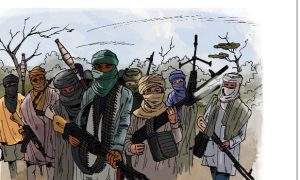
Right from the time immemorial, security has been one of the most indispensable necessities for mankind. Guarding privacy and ensuring the safety of dear ones has remained an ancient culture for a man.
Therefore, it is a famous obligation for any government to protect the lives and properties of its citizens. But the issue of security in Nigeria has become something of grave concern to all well-meaning citizens of the West African country.
In the last seven years_between 2015 and 2022_not less than N12 trillion was budgeted for security. However, despite the government’s mammoth funding in defense
and other security needs over the past seven years, insecurity has predominantly remained the order of the day in Nigeria.
According to the Global Terrorism Index (GTI), Nigeria has two of the five deadliest terrorist groups in the world: Boko Haram and Fulani extremists, unleashing their violence activities in the North-West and North-Eastern part of the country.
The south-west of Nigeria is plagued by a surge in cybercrime, armed robbery, extrajudicial killings among others. While the south-east serves as a haven for ritual killings, commercial crime, secessionist agitation on the endless list.
The south-south on the hand remains threatened by militancy, kidnapping, and environmental agitation.
Behind Afghanistan and Iraq, Nigeria was rated the 3rd worst country with insecurity in the world in 2020 by the GTI. And no fewer than 8372 people lost their lives to security challenges in Nigeria in 2021.
It is, therefore, safe to say that insecurity in Nigeria has assumed a soft spot in political stance and constitutes a grave challenge to humanity.
Recent security attacks in different parts of Nigeria, especially the kidnapping of school children in the North-West, North-Central, and North-East, have increased the number of out-of-school children to over 10 million.
Nigeria has also been the world’s poverty capital since 2016. This has been attributed to the challenges of insecurity, where people’s significant sources of economic livelihood have significantly been affected by terrorism, banditry, and farmers/herders’ frequent clashes.
There are increasing cases of health crises, hunger, and starvation. Women and girls have been exposed to rape, forced marriages, lack of education, lack of equal economic opportunities, and other abuses even in camps for Internally Displaced Persons (IDPs) where they seek refuge.
Meanwhile, the importance of journalism in addressing national security in a democratic setting cannot be overemphasized, as it is the bridge between the people and its societal activities. For any activity to get noticed, it must be reported by the journalists. The media must therefore make national security part of its principal agenda so as to make positive impacts.
Though the nature of insecurity in Nigeria is complex, through consistent meaningful and responsible coverage of acts that breed insecurity in the country, journalism can sensitize the public against such acts. Frequent discussions on issues of insecurity will not just attract attention to the need to address such challenges but also raise citizens’ consciousness and that of the security agents on the need to combat insecurity.
Shereefdeen Ahmad
